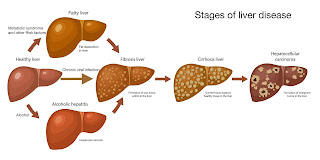Alcohol may make your problems disappear momentarily. But, it does more harm than good in the long run. Overindulgence in alcohol is indeed injurious to health and it may leave your liver in shambles. Such damage caused to your liver may prove to be fatal. Therefore, beware of drinking too much alcohol and be aware of liver cirrhosis.
What is liver cirrhosis?
Liver cirrhosis is a critical medical condition that renders your liver permanently damaged. It develops little by little ultimately leading to failure of the liver. If a person is diagnosed with cirrhosis, it means that their liver has been damaged completely.
Liver cirrhosis has two stages, namely:
● Compensated Cirrhosis: The individuals who suffer from compensated cirrhosis show no symptoms, i.e., they are asymptomatic. Usually, people with compensated cirrhosis live for about 9-12 years.
● Decompensated Cirrhosis: Individuals suffering from decompensated cirrhosis develop several complications such as jaundice, hepatic encephalopathy, hepatorenal syndrome, etc. The livers of people with decompensated cirrhosis are damaged in all their totality and they hardly survive beyond two years.
Fact: According to a study conducted in the year 2018, liver cirrhosis was found to be among the top 20 causes of disability-adjusted life years and years of life lost and it accounted for about 1.6% and 2.1% of the total global burden.
What are the causes behind liver cirrhosis?
Liver cirrhosis results from a wide variety of factors, some of which have been listed below:
● Excessive intake of alcohol
● Fatty liver
● Chronic viral hepatitis (Hepatitis B, C and D)
● Cystic Fibrosis
● Hemochromatosis i.e. accumulation of iron in the liver
● Wilson’s disease i.e. accumulation of copper in the liver
● Poorly developed bile ducts
● Genetic digestive disorder or Alagille syndrome
● Autoimmune hepatitis
● Destruction of bile ducts
● Certain medicines etc.
What are the symptoms of liver cirrhosis?
During the early stages of liver cirrhosis, a patient is likely to exhibit the following symptoms:
● Loss of appetite
● Feelings of fatigue
● Fever
● Nausea
● Weight loss
The symptoms of liver cirrhosis during the later stages of the disease include the following:
● Developing bruises easily
● Bleeding
● Itchy skin
● Swollen legs, feet and ankles
● Fluid accumulation in the abdominal area
● Brownish or orange-coloured urine
● Yellow skin caused by jaundice
● Light-coloured stool
● Blood in the faecal matter
● Redness of palms
● Difficulty in terms of thinking
● Memory loss in certain cases
● Premature menopause in women
● Loss of sex drive, shrunken testicles, etc. in case of men
What are the complications resulting from liver cirrhosis?
Liver cirrhosis may lead to a number of complications. These include the following:
● Portal hypertension or a rise in the blood pressure in the veins that carry blood from the spleen and intestines to the liver
● Splenomegaly or enlargement of the spleen
● Varices in the oesophagus or in the stomach
● Malnutrition
● Certain kinds of bone diseases
● Higher chances of developing liver cancer, etc.
How can liver cirrhosis be diagnosed?
Liver cirrhosis can be diagnosed through blood tests, imaging tests like CT scans, MRIs and biopsy.
How to prevent liver cirrhosis?
Liver cirrhosis may lead to several complications. The need for a liver transplant may also arise. Therefore, the following measures can be adopted to prevent liver cirrhosis:
● Avoid indulging in alcohol.
● It is important to have a balanced diet loaded with nutrients.
● Reduce excess body weight.
Once a person is diagnosed with liver cirrhosis, nothing can be done to cure it. It might necessitate a liver transplant since it is the last resort. But, only a few transplantation needs are fulfilled. A 2018 study revealed that less than 10% of the liver transplantation needs could be fulfilled. It does not sound very promising. Therefore, prevention is better than cure.
Key Takeaways
1. Liver cirrhosis is that stage when the liver of a person is damaged beyond recovery.
2. The symptoms of liver cirrhosis become more complicated during the later stages of the disease.
3. Liver transplant may be the only option left for people diagnosed with liver cirrhosis.
4. Therefore, adopting a healthy lifestyle in order to prevent cirrhosis is the best possible way to keep the malady at bay.
Cirrhosis: Incidence, Symptoms, and Treatment


Post new comment
Please Register or Login to post new comment.